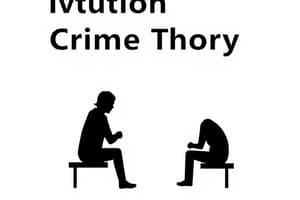Podcast
Questions and Answers
According to Schreck's Extended Low Self-Control Theory, which of the following is NOT an element of self-control that increases vulnerability?
According to Schreck's Extended Low Self-Control Theory, which of the following is NOT an element of self-control that increases vulnerability?
- Risk avoidance (correct)
- Empathy
- Future orientation
- Tolerance for frustration
According to Piquero and Hickman's Extended Control Balance Theory, what can happen if an individual has too much control?
According to Piquero and Hickman's Extended Control Balance Theory, what can happen if an individual has too much control?
- They are totally submissive
- They become aggressive
- They exploit others or abuse their power (correct)
- They challenge the control or authority
What happens when an individual has a control deficit according to Piquero and Hickman's Control Balance Theory?
What happens when an individual has a control deficit according to Piquero and Hickman's Control Balance Theory?
- They become aggressive
- They exploit others or abuse their power
- They challenge the control or authority
- They are totally submissive (correct)
According to the socio-structural perspective, victimisation is a reflection of what?
According to the socio-structural perspective, victimisation is a reflection of what?
According to the physical milieu perspective, people are victimised because they live in what type of areas?
According to the physical milieu perspective, people are victimised because they live in what type of areas?
According to the socio-interactionist perspective, victim precipitation can occur in two ways. What are these two types?
According to the socio-interactionist perspective, victim precipitation can occur in two ways. What are these two types?
According to the social exchange perspective, what can lead to victimisation?
According to the social exchange perspective, what can lead to victimisation?
What is the main focus of the socio-structural perspective on victimisation?
What is the main focus of the socio-structural perspective on victimisation?
According to the socio-cultural perspective, victimisation is seen as an expression of what in society?
According to the socio-cultural perspective, victimisation is seen as an expression of what in society?
What is the main focus of the physical milieu perspective on victimisation?
What is the main focus of the physical milieu perspective on victimisation?
According to the social exchange perspective, what can lead to victimisation?
According to the social exchange perspective, what can lead to victimisation?
According to Schreck's Extended Low Self-Control Theory, which of the following is NOT an element of self-control that increases vulnerability?
According to Schreck's Extended Low Self-Control Theory, which of the following is NOT an element of self-control that increases vulnerability?
According to Piquero and Hickman's Extended Control Balance Theory, what happens when there is a control deficit?
According to Piquero and Hickman's Extended Control Balance Theory, what happens when there is a control deficit?
According to Piquero and Hickman's Extended Control Balance Theory, what can happen when an individual has too much control?
According to Piquero and Hickman's Extended Control Balance Theory, what can happen when an individual has too much control?
According to Schreck's Extended Low Self-Control Theory, which of the following is NOT an element of self-control that increases vulnerability?
According to Schreck's Extended Low Self-Control Theory, which of the following is NOT an element of self-control that increases vulnerability?
According to Piquero and Hickman's Extended Control Balance Theory, what can happen when there is a control deficit?
According to Piquero and Hickman's Extended Control Balance Theory, what can happen when there is a control deficit?
According to the physical milieu perspective, people are victimized because they live in what type of areas?
According to the physical milieu perspective, people are victimized because they live in what type of areas?
According to the situated transaction approach, what contributes to the development of a violent interaction?
According to the situated transaction approach, what contributes to the development of a violent interaction?
According to the socio-interactionist perspective, what is victim precipitation?
According to the socio-interactionist perspective, what is victim precipitation?
According to the learned helplessness theory, what behavior do subjects exhibit when placed in an uncontrollable situation?
According to the learned helplessness theory, what behavior do subjects exhibit when placed in an uncontrollable situation?
According to the general systems theory, why is domestic violence perpetuated?
According to the general systems theory, why is domestic violence perpetuated?
Study Notes
Theories of Victimization
- According to Schreck's Extended Low Self-Control Theory, impulsivity is an element of self-control that does not increase vulnerability.
- Piquero and Hickman's Extended Control Balance Theory states that an individual with too much control may experience stress and tension, leading to criminal behavior.
- A control deficit, according to Piquero and Hickman's Control Balance Theory, can lead to criminal behavior as individuals seek to balance their control.
Socio-structural Perspective
- According to the socio-structural perspective, victimisation is a reflection of social and economic inequality in society.
- The main focus of the socio-structural perspective is on how social and economic structures contribute to victimisation.
Physical Milieu Perspective
- The physical milieu perspective states that people are victimised because they live in areas with high crime rates, transient populations, and social disorganisation.
- The main focus of the physical milieu perspective is on the impact of the physical environment on victimisation.
Socio-interactionist Perspective
- According to the socio-interactionist perspective, victim precipitation can occur in two ways: active precipitation, where the victim plays a direct role in the crime, and passive precipitation, where the victim's lifestyle or behavior increases the risk of victimisation.
- Victim precipitation is the idea that the victim's behavior or lifestyle contributes to the crime.
Social Exchange Perspective
- The social exchange perspective states that victimisation can occur when the costs of a relationship outweigh the benefits, leading to conflict.
- The social exchange perspective focuses on the idea that relationships are based on an exchange of rewards and costs.
Situated Transaction Approach
- The situated transaction approach states that the development of a violent interaction is contributed to by the social and cultural context in which it occurs.
Learned Helplessness Theory
- The learned helplessness theory states that subjects exhibit passivity and resignation when placed in an uncontrollable situation, leading to depression and anxiety.
General Systems Theory
- The general systems theory states that domestic violence is perpetuated due to the lack of feedback and the inability to adapt to changing circumstances within the family system.
Studying That Suits You
Use AI to generate personalized quizzes and flashcards to suit your learning preferences.
Description
Test your knowledge on the elements of low self-control theory and its application to victims of crime. Learn about the factors that increase vulnerability such as future orientation, empathy, and tolerance.




